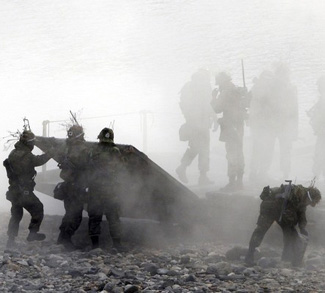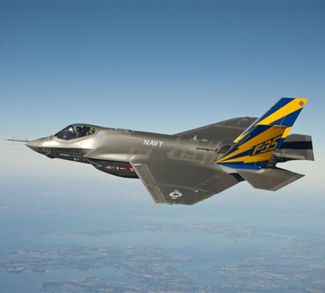FORECAST
With the “war on terror” entering its seventh year, the Bush administration is brokering dozens of foreign weapons deals in order to combat terrorism by re-arming Iraq and Afghanistan, containing North Korea and Iran, and cementing ties with onetime Russian allies. However this surge in US arms sales could turn into a spiraling arms race and decrease stability in a world of shifting alliances.
According to The New York Times, the global arms trade has been thriving on weapons deals that include tanks, helicopters, fighter jets, missiles, remotely piloted aircraft and warships worth $32B, up from $12B in 2005. With the Pentagon acting as a broker and procuring sophisticated weaponry for foreign customers via its Foreign Military Sales program, the bulk of sales have been to the Middle East, but also extend to northern Africa, Asia, Latin America, Europe, and Canada.
As the “war on terror” expands across the globe and the US carves out spheres of influence in each continent, the number of nations that rely on the US as a primary source of major weapons systems is increasing, as evidenced by the recent additions of Afghanistan, Argentina, Azerbaijan, Brazil, Georgia, India, Iraq, Morocco, and Pakistan. In addition to $4.5B a year in military aid to approximately 60 countries (Israel and Egypt receiving more than 80 per cent of that aid), the US is the preeminent arms supplier to the world, with Russia a close second.
However, the growing number of foreign weapon deals, which started to surge in 2006, is now provoking concern among some advocates of arms control and some members of US Congress who believe that such deals could trigger a spiraling arms race driven by fears of North Korea and Iran and by stiff competition from a resurgent Russia.
International stability could also decrease in the following manner: the flood of sophisticated US military equipment pouring into the Middle East could compromise the military edge Israel has long maintained in the region, military sales to Pakistan could do more to stoke tensions with India than combat terrorism along the Afghan-Pakistan border, and former Soviet bloc countries switching from Russian-made MIG-17 fighter jets to new Lockheed Martin F-16s could provide a pretext for Russian reprisals.
Also of concern are shifting alliances, which could see the US fighting against former allies equipped with American-made weapons. The US has fallen victim to this scenario before, as evidenced in their arming of militants to fight the Soviets in Afghanistan during the 1980s, only to eventually confront hostile Taliban fighters armed with the same weapons in 2001. All of these concerns are to underscore the point that arms sales can have unintended and dangerous consequences.
Yet with so many nations now willing to buy and sell advanced weapons systems in an increasingly unstable international climate and with the Bush administration determined to build a more secure world in their image, the surge in the global arms trade, fueled by US arms deals, will continue for several years, creating one of the most lasting legacies of the Bush administration.
SUMMARY OF EVENTS: September 15 – 22, 2008
NORTH AMERICA
Lehman Brothers, a 158-year-old investment bank choked by the credit crisis and falling real estate values, filed for Chapter 11 protection in the biggest bankruptcy filing ever on Monday and said it was trying to sell off key business units.
The destruction of a suspected Syrian nuclear reactor last year was the result of an intelligence collaboration that included a “foreign partner” who first identified the facility’s purpose, CIA Director Gen. Michael Hayden said on Tuesday.
Urgently trying to keep cash flowing amid a Wall Street meltdown, the Federal Reserve on Tuesday pumped another $70 billion into the nation’s financial system to help ease credit stresses.
Wall Street plunged again Wednesday, with anxieties about the financial system still running high even after the government bailed out the insurer American International Group Inc. The Dow Jones industrial average dropped more than 340 points.
Wall Street’s manic dealmaking reached a new pitch on Wednesday as U.S. share prices plummeted to three-year lows and forced increasingly desperate major banks to scramble for merger partners.
The U.S. Senate on Wednesday overwhelmingly approved a $612.5 billion defense spending bill for fiscal 2009, including $70 billion for operations in Iraq and Afghanistan.
Sweeping government measures to rescue the financial system and restore confidence in shaky markets spurred a huge relief rally in stocks on Friday, ending a week when the financial landscape underwent the most dramatic reshaping since the Great Depression.
SOUTH AMERICA
Bolivia
Bolivian troops on Tuesday arrested an opposition governor blamed for 15 deaths during days of political violence that shook the country as President Evo Morales and his opponents tried to negotiate a way out of the crisis.
Venezuela
Venezuelan government officials rejected the U.S. government’s renewed placement of Venezuela on a list of principal countries where illegal drugs are transported or produced, calling it a political maneuver meant to weaken the Venezuelan and Bolivian governments at a time when both are confronting potential coup d’états waged by domestic opposition groups.
EASTERN EUROPE
Russia
Russia authorities halted trading on the country’s stock exchange on Tuesday after it plunged 17 per cent in a broad-based sell-off.
Russian President Dmitry Medvedev signed treaties with Georgia’s South Ossetia and Abkhazia on Wednesday that commit Moscow to defend the breakaway regions from any Georgian attack.
Russian markets stopped trading for a second day Wednesday after emergency funding measures by the government failed to halt the biggest stock rout since the country’s debt default and currency devaluation a decade ago.
Russia threatened to block NATO from using its air space for operations in Afghanistan if member states did not stop “hostile” policies toward Moscow, the Kremlin’s top diplomat in Kabul said.
Ukraine
Ukraine’s governing coalition collapsed on Tuesday in a crisis that threatens to knock the ex-Soviet country of 47 million people off its pro-Western course and back into Moscow’s orbit.
MIDDLE EAST
Iran
A top adviser of Iran’s supreme leader has warned that in the event of war all ships passing through the oil-rich Gulf region would be within the reach of Iran’s missiles, a government newspaper reported on Thursday.
Syria
The Syrian government daily Teshreen marked the seventh anniversary of 9/11 this week in a unique fashion: by publishing an article by Syria’s former information minister blaming US intelligence agencies for the attacks.
West Bank
In the plains around the village of Bardala, the Israeli-Palestinian tug-of-war over land and water plays itself out in vivid colour — largely brown Palestinian farms border green fields owned by Jewish settlers.
EAST ASIA
China
Chinese state media has blamed the US for unleashing financial “weapons of mass destruction” and sparking a global market “tsunami”.
SOUTH ASIA
Pakistan
Pakistani troops opened fire on US soldiers trying to enter the country’s lawless tribal area today, according to reports, marking a dangerous further deterioration in relations between the two anti-terror allies.
AFRICA
Zimbabwe
Zimbabwe’s President Robert Mugabe signed a power-sharing agreement with opposition rival Morgan Tsvangirai on Monday, relinquishing some of his powers for the first time in nearly three decades of iron rule.
Marsha Reid is a contributor to Geopoliticalmonitor.com



